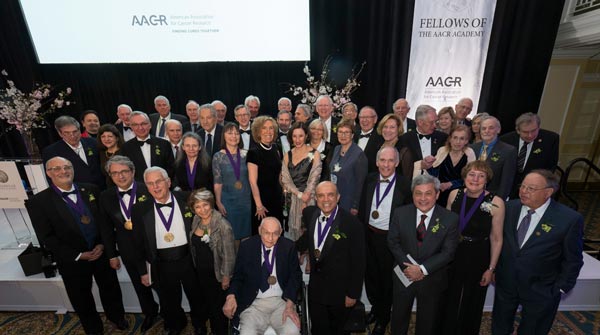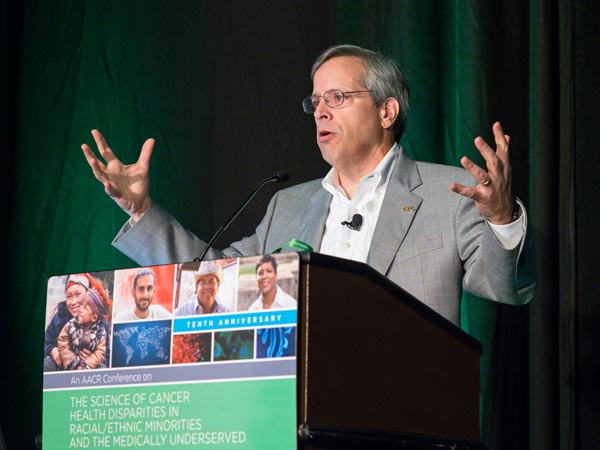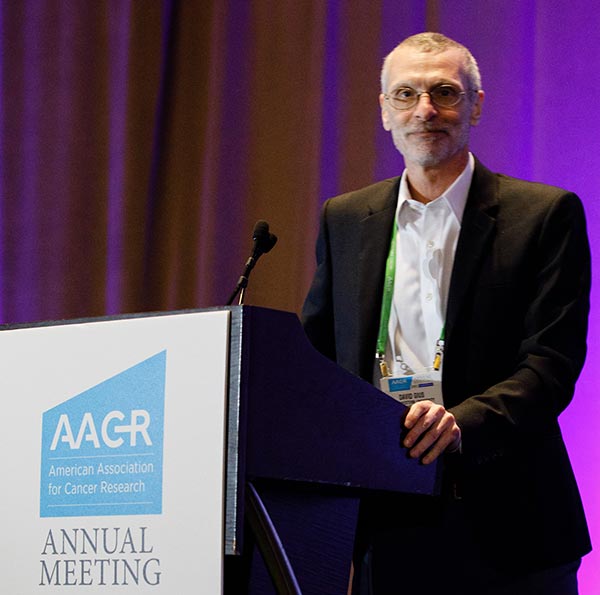LEADING DISCOVERIES, TARGETING CURES, SAVING LIVES
Throughout this anniversary year, the AACR has celebrated 110 years of leadership in the cancer community. In 2018, the AACR will engage all elements of that leadership role—scientific expertise, innovative thinking, and collaborative spirit—to change the face of cancer going forward.
As outlined below, the AACR leadership and staff will continue working in 2018 to implement the priorities laid out in the Strategic Plan and to realize the vision of AACR President (2017-2018) Michael A. Caligiuri, MD. They will honor the legacy of the founders of the AACR by creating the future those founders envisioned—a future defined by the prevention and cure of all cancers.
Fellows of the AACR Academy: Governance
Since its founding in 2013, the AACR Academy has provided advice and counsel to the AACR leadership on scientific topics and other significant issues. In 2018, the Academy’s critical role will be formalized with the establishment of a governance structure. Current Fellows of the AACR Academy will elect an inaugural President-Elect, whose one-year term will begin at the AACR Annual Meeting 2018. This individual will then transition to the role of President at the Annual Meeting 2019. This new governance structure will empower the AACR Academy to fulfill the duties in its charge, which include identifying scientific priorities that will drive future progress in cancer research; influencing science and public policy and advocating for increased federal funding for cancer research; and mentoring the next generation of cancer scientists.

Working to Eliminate Cancer Health Disparities
Throughout his term, 2017-2018 AACR President Michael A. Caligiuri, MD, has highlighted the critical issue of cancer health disparities and has called for an assessment of the scientific questions that must be answered to ensure that all patients—regardless of race or socioeconomic background—benefit from emerging breakthroughs in cancer treatment. In an opening address to attendees of the Tenth AACR Conference on The Science of Cancer Health Disparities, held in October 2017, Dr. Caligiuri announced the “2020 by 2020 Presidential Initiative,” a collaborative effort to sequence 2,020 cancer genomes from African-American/Black cancer patients by the year 2020. To conduct the 2020 by 2020 initiative, the AACR is partnering with Pelotonia (through The Ohio State University Comprehensive Cancer Center–Arthur G. James Cancer Hospital and Richard J. Solove Research Institute) as well M2Gen and the Oncology Research Information Exchange Network (ORIEN).
To reach the goal, the partners will facilitate the development of an infrastructure for consenting African-American patients to the ORIEN Total Cancer Care Protocol at Morehouse School of Medicine in Atlanta. Morehouse is already a member of ORIEN; the injection of support through the 2020 by 2020 initiative will substantially increase the number of patients that the center can accrue and will allow for the continued collection of material from cancer patients well beyond the year 2020. The data will also be added to the AACR Project GENIE registry, and it will be provided to publicly accessible genome registries to benefit academic and industry researchers studying cancer and cancer outcomes in African-American populations. Under Dr. Caligiuri’s leadership, large-scale sequencing will begin in 2018 with the hope that this pilot program will be expanded to include other minority populations in the future.
New Collaborations to Advance Cancer Science and Medicine
The AACR is a catalyst for collaboration, bringing together scientists, clinicians, survivors, and advocates to attack the cancer problem. That collaborative spirit extends to the enterprise level, as AACR leaders work with their counterparts in other scientific organizations to pool resources, share ideas, and challenge each other to excel. The AACR collaborated with more than a dozen organizations in 2017 to organize meetings, train investigators, and advocate for support for cancer research. These collaborations will expand to new areas of research and new organizations in 2018.

INCREASING FOCUS ON HEMATOLOGICAL MALIGNANCIES
One of the scientific priorities identified by the AACR Board of Directors during the development of the Vision 2020 Strategic Plan was the expansion of programs focused on hematological malignancies, and the AACR leadership is developing a plan to address this important strategic objective. While the increased collaboration with ICML and the upcoming conference on Advances in Malignant Lymphoma are an important part of this plan (see above), the AACR will explore launching new initiatives (such as conferences and think tanks) and expanding existing ones (such as the Annual Meeting program) in 2018 to better support the needs of blood cancer researchers.
FOSTERING INNOVATIVE SCIENCE: NEW TASK FORCES AND THINK TANKS
The first strategic priority of the Vision 2020 Strategic Plan is “to identify and foster innovative science that is of the highest priority and potential for impact in reducing cancer incidence, morbidity, and mortality.” To achieve this objective, the AACR will be convening several task forces and think tanks over the next few years to support critical scientific foci, including the following areas in 2018:
Leadership Support for the Biden Cancer Initiative
As his term came to a close, former Vice President Joe Biden successfully led the effort to pass the 21st Century Cures Act, which provided $1.8 billion over seven years to fund the scientific priorities of the National Cancer Moonshot Initiative. While federal agencies have continued the efforts outlined in the Moonshot Task Force report, Mr. Biden launched a new venture, the Biden Cancer Initiative, in June 2017. The mission of the Biden Cancer Initiative is to develop and drive implementation of solutions to accelerate progress in cancer prevention, detection, diagnosis, research, and care, and to reduce disparities in cancer outcomes.

AACR President-Elect (2017-2018) Elizabeth M. Jaffee, MD (right), served as co-chair of the Cancer Moonshot Blue Ribbon Panel, which developed a set of ten transformative research recommendations to achieve the Cancer Moonshot's ambitious goal of making a decade's worth of progress against cancer in five years. Her leadership role continued in 2017, as she was one of five AACR members appointed to the Biden Cancer Initiative’s Board of Directors. As Dr. Jaffee begins her term as AACR President in April 2018, the AACR will continue to collaborate with the Biden Cancer Initiative toward their shared goal of ending cancer as we know it.
